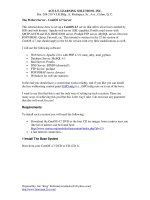IT training the rosedale diet (gnv64)
Bạn đang xem bản rút gọn của tài liệu. Xem và tải ngay bản đầy đủ của tài liệu tại đây (3.54 MB, 446 trang )
the
Rosedale
diet
RON ROSEDALE, M.D.,
and CAROL COLMAN
fjarlttc:tbCl..rl!l
To my parents, my sisters, and my son
for their love and support
RON ROSEDALE
Contents
Part One
Everything You Need to Know About the Rosedale
Diet
Chapter 1
Chapter 2
Chapter 3
Chapter 4
Get Slim, Live Longer. Be Healthier
Are You Leptin Resistant? Take This Quiz
The Vicious Cycle: From Fat to Fatter
How the Rosedale Diet Can KeepYou Young
Part Two
Making the Rosedale Diet Work for You
Chapter 5 Why Good Fat Does a BodyGood
Chapter 6 The Rosedale Diet Guide to HealthyEating
Chapter 7 GettingStarted: Weeks One to Three
Chapter 8 A Guide to the Rosedale Diet Suppl ement Program
The Rosedale Diet Supplement Plan
The Rosedale Diet Supplement Plan Plus
Chapter 9 Rosedale Diet Exercise Strategies
Chapter 10 The Leptin Test and Other Medical Tests That Can
Save Your Life
Chapter 11 GettingHealthywith the Rosedale Diet
Afterword
Rosedale Resources
Your 2 1 -DayFood Diary
How Much Protein Should You Eat EveryDay?
For Women Only: Protein Requirement WOlksheet
For Men Only: Protein Requirement Worksheet
Rosedale Diet Recipes
Product Information
References
Searchable Terms
General Searchable Terms
Recipe Searchable Terms
Acknowledgments
About the Author
Credits
Cover
Copyright
About the Publisher
Part One
Everything You
Need to Know About
the Rosedale Diet
Cbaptl'r One
Get Slim,
Live Longer,
Be Healthier
Want a slim, sculpted body and a longer life? There's a tried and
true way to achieve both. Eating less . . . a lot less. Decades ago,
researchers discovered that if you put laboratory animals on a very
low calorie diet - about one-third fewer calories than normal they can live up to two times longer than well-fed animals. Not
surprisingly, food-restricted animals retain their sleek. youthful
figures. What is truly amazing. however, is that their bodies not
only appear younger, but by every objective laboratory measure,
they are younget: Levels of key hormones that normally fluctuate
with age, and other important markers of aging remain remarkably
stable. Nor do food-restricted animals suffer as often from the
chronic diseases associated with "normal" aging, such as diabetes,
heart disease, and cancer.
Slim for life. Healthy for life. A longer life in a "younger"
body. Despite these wonderful results, no one is seriously
suggesting that humans should follow such a punishing diet. Who
wants to starve? Who willingly can?
The fact is, you don't have to starve to be in great shape or to
enjoy the prospect of a longer, disease-free life. Thanks to the
Rosedale Diet, you can have all the benefits of a strict, low calorie
diet - a great body, great health, and the promise of longevity
without ever having to feel a hunger pang.
The even better news is that you can lose weight and get
healthy while still eating delicious meals and snacks such as
chicken tortillas, wraps, guacamole, nuts (even so-called fattening
nuts like macadamia nuts), lobster salad, raspberry cheesecake,
and eggs Benedict. No starving. No hunger. The best part of all is
that you will be back in control of your hunger, your weight, and
your life.
My program has worked for thousands of my patients, and it
can work for you. By following the Rosedale Diet, my patients
have not only successfully lost weight. but have rejuvenated their
bodies and reclaimed their health. The once obese are now trim
and fit, in an amazingly short period of time. Remarkably, the
same biomarkers of longevity seen in calorie-restricted animals
are seen in my patients. In fact, by every objective laboratory
measure, my patients have "de-aged" their bodies:
•
•
•
•
High blood sugar levels, a hallmark of aging, fall to normal,
healthy levels.
Body temperature stays lower in my patients, a sign that
their bodies are running more efficiently.
Key hormones are restored to more youthful levels.
High blood lipid levels (triglycerides) plummet to a healthy
range.
The so-called diseases of aging, such as type 2 diabetes, a
veritable epidemic among people over forty, and heart disease, the
number one killer of both men and women, are vastly improved.
In fact, after following my program for a few weeks, my patients
are able to throw out most of their prescription medicines.
My patients not only look great, but they tell me that they feel
great too, and have a huge amount of energy. The best news is,
unlike calorie-restricted animals who are kept in cages and starved
to enjoy these benefits, my patients feel full and satisfied. It's too
early to say whether my patients will live longer - we need to
wait another thirty or forty years for that data - but all
indications are that they will. I can say with certainty that the
ql1alityof their lives is significantly better. (My patients can speak
for themselves, and they do. They tell their own stories in their
own words, throughout this book.)
Within this book, you will find the tools that you need to take
back control of your weight, and ultimately, your life. You will be
empowered with the latest scientific information on how to lose
weight safely, quickly, and permanently. Once you start the
Rosedale Diet. you. too, can experience the same spectacular
success in terms of both weight loss and better health enjoyed by
my patients.
Getting to the Heart of Obesity
The Rosedale Diet works because it corrects the underlying
metabolic aberration at the root cause of both obesity and
premature aging: hormonal dysfunction. Hormones are chemical
messengers that direct all body activities, including how much
you eat, and ultimately. whether you are fat or fit. Your hormones
can work for you or against you. The wrong diet creates hormonal
imbalances that trigger hunger and food cravings, the main
problems that prevent people from losing weight and keeping it
off. The right diet - the Rosedale Diet - almost magically
controls hunger and eliminates food cravings. That is why it
works so well.
Hunger is a powerful force. As I tell my patients, following a
diet while trying to fight hunger is like trying to hold on to the
edge of a cliff and hoping that gravity will go away. Eventually,
you're going to let go. If you're hungry, eventually you're going
to eat and chances are, you'll overeat to make up for lost time.
How does my diet curb hunger? The Rosedale Diet is
specially designed to control the key hormone that regulates both
appetite and weight loss. That hormone is Jeptin. Leptin is
produced by your fat cells. It tells your brain when to eat, how
much to eat and most important, when to stop eating. Leptin is
also critical for many of the body's most important functions,
including the regulation of blood circulation, the prevention of
blood clots, making new bone, regulation of body temperature,
and reproduction. In fact, if a woman produces too little leptin,
she will stop menstruating, and therefore will be unable to
conceive. Very recently. leptin amazed the scientific community
when it was found to be able to rewire critical and central portions
of the brain to better do its bidding. The more scientists research
leptin, the more they learn about how vital it is to life.
As hormones go, leptin is the new kid on the block. In fact,
it's so new. most of your doctors may not have heard of it, or are
unsure what it does. Yet, I consider leptin to be so important for
the health and well-being of my patients that I always measure
their leptin levels, and if I have any say in the maUer. doing so
will become standard medical practice within a few years.
Measuring leptin is easy - it's a simple blood test - but it tells
me volumes about my patients' potential for gaining weight and
the ease with which they will be able to shed excess pounds.
Blood leptin levels indicate how well ieptin is functioning in your
body. High fasting levels of leptin (from blood taken after waking
and before eating breakfast) mean that leptin is not functioning
well, and therefore. unless leptin is brought down to a healthy
level, losing weight and keeping it off will be an insurmountable
challenge. Low fasting leptin levels mean that leptin is able to do
its job and that your body won't sabotage your weight-loss efforts
by making you constantly hungry.
More important, leptin levels are a bellwether as to how well
a person is aging. If their leptin levels are high. it bodes
ominously for their health, and that bodes poorly for longevity. In
fact, remember those calorie-deprived laboratory animals that
were much healthier and lived well beyond their normal life span
that I described earlier? They had very low leptin levels compared
to their well-fed peers. Fortunately. it is easy to lower your leptin
levels without starvation by following the Rosedale Diet, as I'll
describe later.
Leptin Helps You Lose Fat
When patients come to me saying that they would like to lose
weight, what they are really saying is that they want to lose fat.
No one wants to lose muscle or bone! The goal of dieting is to
bum off excess fat so that it doesn't end up on your abdomen,
thighs. rear end, or in your arteries where it can cause a heart
attack. Leptin not only controls hunger. but it is the hormone that
tells the body whether it should burn away excess fat. This is one
of the most critical messages thatyour body must hear to
maintain normal weight and optimal health.
When leptin levels can be properly �heard, " it alerts your
brain and other body tissues that you have eaten enough and
stored away enough fat, and it's now time to burn off some excess
fat. This feedback system is designed to prevent you from getting
fat. In order for leptin to be heard clearly, however, leptin levels
must remain stable and low. When leptin levels spike too high,
too often, your cells stop listening to leptin. In medical terms, they
become �resistant" to leptin's message. When your brain and
other body tissues don't properly "hear" leptin's message, your
brain continues to believe that you must hoard away even more fat
for a rainy day. It tells you, "Be hungry, eat, and store more fat. "
Before too long, you will be fat.
If you want to lose weight, and keep it off, you must first
maintain lower leptin levels so that your brain and body tissues
can relearn how to listen to leptin. I often refer to my diet as a
leptin sensitizing diet as opposed to a weight-loss diet. The fact is,
you can't do one successfully without the other. When leptin
sensitivity is restored, you will stop storing excess fat and instead,
start burning it off. Best of all, your hunger will be controlled, you
will not have food cravings, and you will have a trim, well-toned,
and healthy body.
The Optimal Diet
Unlike stereotypical �dieters," my patients don't �yo-yo" up and
down the scale, nor do they flit from my diet to the next fad diet.
Most have stayed with me for years, and the reason they stay is
that my diet works. The Rosedale Diet is dramatically different
from standard weight loss diets, which I believe is the key to its
success.
The average American has such poor eating habits that
making any change is likely going to be an improvement, but
that's not saying much. Follow any of the popular weight-loss
diets, and you'll probably lose some weight, but you won't be
restoring leptin sensitivity as effectively, so you'll still be battling
hunger. Moreover, simply losing weight does not necessarily
mean that you are losing weight in a healthy way, or that you'll be
able to keep it off. Eating for optimal health as well as to lose
weight is a greater challenge, and doing it for the long-term is a
greater challenge yet. Yet that is exactly what the Rosedale Diet
does.
Virtually all of the popular diets today are basically variations
on the same two themes: (1) the high carbohydrate-low fat diet
(heavy in grains, starches, salads, and fruit) or (2) the high
protein-low carbohydrate diet (heavy in meat, fish, poultry, dairy,
and eggs). Neither type is as effective as mine, and no popular diet
other than the Rosedale Diet has been shown to control leptin.
As its name implies, the high carbohydrate-low fat diet
severely restricts fat intake. You can't eat much protein because it
is often high in fat, and you are forced to eat mostly starches (like
pasta), grains, and salads. As I will explain later, many
carbohydrates - even the ones you think are healthy - can cause
those spikes in leptin that will make you leptin-resistant.
The all - the - protein - you - can - eat - diet fixates on eating
protein and ignores fat. Your plate is piled high with meat of any
kind, and as much as you like, but you are severely restricted in
your carbohydrate intake. The dirty secret of high protein diets is
that if you eat more protein than your body requires, the excess
can turn toxic and can threaten your health. There is even growing
evidence that a high protein diet significantly increases your risk
of heart disease, another fact you won't hear from proponents of
these diets.
In contrast to the standard other weight-loss diets, the
Kosedale lJiet focuses on fat - burning fat and eating fat. In fact,
it allows you to eat up to half or more of your daily calories in the
form of fat, as long as it's the right kind of fat. Since fat is what
gives food much of its flavor and texture, eating a high fat diet is
hardly a hardship. You also eat protein on my diet, but in the right
amount, because excessive protein consumption can be
dangerous. You can also eat a fair amount of carbohydrate, but
only the healthy ones that won't cause the precipitous spikes in
leptin that are so damaging to health.
Fat Can be Good
It may seem counterintuitive - even reckless - to recommend
that overweight people eat more fat. Haven' t we been told that fat
is what makes you fat, and that fat is what causes heart disease?
Actually, this is only half true. Eating fat does not necessarily
make you fat and unhealthy . . . not being able to burn fat does.
Furthermore, not all fat is the same. Fat can be your best friend or
your worst enemy. Some fat is bad, notably excess amounts of
most saturated fc7t, found in most meat and in full fat dairy
products and omega-6 fats found in many kinds of vegetable oils.
So, too, are trans fats found in fried and many processed foods.
These �killer" fats can increase the risk of heart disease, diabetes,
and a myriad of other health problems. That's one of the reasons
why I don't like high protein and other low carb diets which do
not distinguish between killer fats and good fats.
Trying to cut all fat out of our diets, we have eliminated the
good fats: monounsaturated fats and omega-3 fatty acids. These
fats are found in foods that are often restricted in other diets, but
not on mine. On the Rosedale Diet, you can eat nuts such as
almonds, walnuts, cashews and nut butters, avocados (yes, on my
diet you can eat guacamole) , fatty fish, non grain-fed beef,
omega-3 enriched eggs, and high quality vegetable oils. Our
bodies thrive on good fat. Our metabolism needs good fat to burn
bad fat. Our cells need good fat to work properly. Our brains need
good fat to think. Most important, good fat lowers leptin levels,
improving the quality of leptin signaling so that our cells hear
leptin better, thereby controlling hunger. Remember, eating fat
doesn't make you fat - the inability to burn fat is what makes you
fat. Good fat turns you into a wonderful fat burner. It is truly a
miracle food.
How I Learned About the Leptin Link
As founder of the North Carolina Center for Metabolic Medicine,
cofounder of the Colorado Center for Metabolic Medicine, and
founder of Rosedale Metabolic Medicine in Denver, Colorado, I
have treated patients from all over the world, many of whom are
casualties of other diets. I attracted a great deal of attention in the
medical community nine years ago when I was one of the first
doctors to lecture about the importance of insulin resistance and
by showing that I was able to cure, yes, care, many cases of
diabetes through diet alone.
GOOD-BYE FOOD eRAVINGS
. . . HELLO TASTE BUDS
When your cells can't "hear" leptin's messages, you will
not only be hungry all the time, but you will crave sweets.
Why? Leptin resistance desensitizes your taste buds to
sugar. That means, the more sugary foods you eat, the
less likely you are to discern a sweet taste, so you will
need more and more high-sugar snacks to feel satisfied.
Whereas once almonds, blueberries or cinnamon tea
would taste sweet enough to be treats, you now require
multiple sugar hits - cookies, cake, candy bars, soft
drinks, or a pint of ice cream - before you feel you've
had enough. Once leptin sensitivity is restored and your
taste buds shift into high gear, you will get much more
pleasure from eating. You will rediscover the natural
sweetness in food and will actually find that the
supersweet snacks you once craved now taste sickeningly
sweet.
As many of you know, there are two types of diabetes: type 1
and type 2. Type 1 diabetes (also called juvenile diabetes) is a
result of too little insulin, the hormone that is produced in
response to rising blood sugar levels. Without enough insulin,
blood sugar levels can climb dangerously high, leading to organ
damage and death. Type 2 diabetes (also called adult-onset
diabetes) is an entirely different story. Type 2 diabetes is
characterized by a condition called insulin resistance, which
occurs when the cells of the body are constantly exposed to high
levels of insulin. When you become insulin resistant, your body is
making enough insulin, but your cells do not utilize it effectively.
(The same thing occurs with leptin, causing leptin resistance.)
I lecture frequently to medical groups, and I am passionate
about teaching other physicians that food is indeed the most
powerful medicine. I believe that physicians should strive to get
patients on a good diet and off drugs, whenever possible. It has
become fashionable these days to quote Hippocrates, who said,
�Let food be your medicine and medicine be your food." In my
case, that philosophy is the cornerstone of my medical practice.
I am also a well-known specialist in the field of aging, and
lecture on that topic as well. It is not unrelated to diabetes. In fact,
my interest in diabetes was sparked by the observation that
diabetics suffered from the so-called diseases of aging, such as
arthritis, heart disease, cataracts, and even dementia at a much
earlier age than normal. They even look older at an early age.
From that realization, it dawned on me that the metabolic disorder
of diabetes is a disease of rapid aging, and what we consider to be
the "normal" diseases of aging are in reality due to an underlying
disease of metabolic dysfunction.
I have come to believe that leptin resistance is at least related
to, if not at the foundation of the majority of disorders related to
aging, including heart disease, diabetes, obesity, osteoporosis,
arthritis, and even aging itself. I know that many of you are
probably thinking, how could one hormone - let alone a
hormone that most of you have probably never even heard of
before - be so important to health and longevity? In the chapters
to come, I'll answer this question and you will see the critical role
that leptin plays in your body.
Modern medicine has focused on merely treating symptoms,
such as high cholesterol or elevated blood sugar, and not the true
disease that underlies those symptoms, for that is far easier. . . and
therefore more lucrative. My experience has taught me that
treating symptoms simply masks problems, and will almost
always make them worse, not better. If you lower leptin to healthy
levels, you will go a long way toward preventing and treating a
main root of what we call the diseases of aging and, in fact, aging
itself. I believe that the diseases of aging are not inevitable, and
that they are aggravated, if not caused, by the typically poor
American diet.
De-Age Your Body with The Rosedale Diet
When I say that I believe in the power of food, I mean it. I have
found that the Rosedale Diet is much more effective medicine
than any combination of drugs and surgery could ever be. I don't
write prescriptions for so-called longevity drugs like growth
hormone or other "magic" anti-aging medicines. I don't prescribe
drugs for weight loss, and am very against the use of any so-called
lhennugenic agenLs like ephedra (IlIa huang) , which has ueen
banned by the FDA, and caffeine to lose weight. They are not safe
or particularly effective and, moreover, they actually can
accelerate the aging process. I believe that proper diet is the
primary way to achieve permanent weight loss, optimal health,
and a longer life.
I also recommend nutritional supplements, but there is no
supplement that can undo the damage of a poor diet. You need to
eat well to make the supplements work well.
I am a metabolic specialist who has devoted my career to
treating diseases such as obesity, heart disease, and diabetes. My
interest in metabolism began when I was a medical student at
Northwestern University, and I had the privilege of working with
Dr. Jeremiah Stamler, one of the first to study the correlation
between elevated cholesterol and heart disease. Until then, the
medical establishment had all but ignored the role of diet in
disease. It was already thought that a high fat diet could increase
cholesterol levels in the body, and after his research, everyone
jumped on the "no fat-no cholesterol" bandwagon. We were told
that the ideal diet was low in fat and cholesterol, and high in
carbohydrates, especially for diabetics, who were at greater risk of
heart disease. We didn't know about leptin yet, nor did we
understand the role of insulin in metabolic disease, nor did we
differentiate between good fats and bad fats. I saw diabetic
patients on this so-called ideal diet get worse, not better. Worst of
all, they were always hungry and couldn't stay on that diet. I
asked myself why the standard diet wasn't working. If fat was the
culprit, why were diabetic patients on the low fat diet getting
worse and developing high triglycerides and other lipid
abnormalities? Why did most of them require more, not less
medicine on this diet? Why were they so unhappy and so hungry?
One day it dawned on me that the high carbohydrate-low fat
diet that was being prescribed to diabetic patients was precisely
the wrong therapeutic approach. The reason why now seems
obvious, but a decade ago, it was revolutionary bordering on
heretical. Carbohydrate in any form other than fiber is eventually
metabolized by the body into sugar. In fact, it starts turning into
sug:u �s soon �s it hits the s�1iv� in your mouth. Tt r1Of�sn't m�tter
if it's a piece of fruit, a brownie, or a bowl of whole grain cereal,
it still turns to sugar, and feeding sugar to a diabetic to lower
blood sugar is nonsensical. (There are some carbs that are better
for you than others, but nevertheless, any carb that is not fiber
eventually ends up as sugar.)
Excess Protein is Just as Bad
If high carbohydrate wasn't the right approach, that left two other
major food categories on which to base a diet: protein and fat. It
may surprise you to learn that the protein that the body doesn't
qUickly use to repair or make new cells is largely broken down
into simple sugars, which increases blood sugar and promotes
insulin resistance. Furthermore, protein itself triggers insulin
production, which can worsen insulin resistance. (That is why
diabetics should never go on a very high protein diet.)
Having ruled out carbohydrates and protein, I decided to try
putting my diabetic patients on a high fat diet, but only using
healthy fats, such as those you'll eat on the Rosedale Diet. When I
switched my patients to this new diet, I saw vast improvements in
nearly every case. In addition to losing a lot of unwanted weight,
patients were able to reduce or eliminate their medication. And
they never complained that they were hungry. I was so impressed
with these results that I recommended the diet for my nondiabetic
patients who were trying to lose weight, many of whom were
insulin resistant. The weight literally melted off them, and most
were able to keep it off. Years later, after the discovery of leptin, I
found out why my diet worked so well. It lowered leptin levels
qUickly and effectively. I also discovered why the other diets had
failed. They didn't lower leptin levels nearly as well or as
effectively; in fact, they often raised leptin levels! (Shockingly,
most diabetics are still being treated with the high carbohydrate
low fat diet.) I offer the only alternative that works, and works
fabulously well and works the best: the Rosedale Diet.
"Listening" to Leptin
When leptin was first discovered in 1995, it was dubbed the "holy
grail of weight loss," and there were high hopes among the
scientific community that the cure for obesity had finally been
found. Initially, scientists believed that if you gave overweight
people supplementary leptin, it would stimulate fat burning. But
when they measured leptin levels in overweight people, they were
in for a big surprise. Most overweight people - and nearly all
obese people - are not leptin deficient; in fact, they produce too
much Jeptin. As a result, they become leptin resistant, much the
same the way people with type 2 diabetes are insulin resistant.
When a person becomes leptin resistant, it takes more and
more leptin to tell the brain that it's satisfied and that you don't
need more food. Therefore, it takes more and more food to feel
satisfied. The brain, not hearing leptin, frantically Signals for more
and more fat to be stored. Since leptin is made by fat cells, you
have Lu make mure amI more Cal Lu produce enuugh lepLin lu
finally get its message across to the brain to stop being hungry and
stop storing fat. This creates a vicious cyde: you eat more because
your brain doesn't know how to tell you to stop, and the only way
you can stop is by producing more fat to make more leptin, which
means that you keep getting fatter, and more insulin and leptin
resistant, which just makes you want to keep eating more.
Certain foods feed into this vicious cyde by triggering a huge
surge in leptin production. Carbohydrates - induding breads,
grains, cereals, pastas, and starchy vegetables - are the worst
offenders. When you eat these foods, your leptin levels soar.
These foods can create even more mischief because they are
broken down into simple sugars that can be rapidly burned by the
body. If sugar is available, and your body is given a choice
between burning fat and burning sugar, it burns mostly sugar. So
all that fat you have socked away stays exactly where it is. Here's
the kicker. What happens to extra sugar that isn't burned? It gets
made into saturated fat, which is resistant to burning. What
happens to all that stored extra fat? It produces even more leptin
in response to sugar, which worsens leptin resistance.
Are high protein diets any better? Protein is used to repair
and rejuvenate the body, but the body can only use a limited
amount of protein at a time. What isn't used is largely converted
into glucose (a form of sugar), and burned. What isn't burned is
made into fat - saturated fat. To compound the problem, most of
the protein we eat today, particularly beef and chicken, are grain
fed to fatten them up, not just grass-fed as they were in the old
days. Grain feeding produces animals much higher in saturated fat
than normal. I often refer to the fat in grain-fed animals as
�second generation starch," because the starchy carbohydrates that
the animals eat will ultimately be stored as fat in us. Thus, the
longtime nutritional advice of the medical profession to eat a high
carbohydrate, low saturated fat diet is an oxymoron!
The First Step - Lower Leptin
From my experience with thousands of patients I have learned that
once you lowerleptin levels and regain leptin sensitivity, leptin
can then begin to do its vital job of turning off the hunger switch
and turning on the fat-burning switch. Any weight-loss diet that
does not lower leptin qUickly is putting the cart before the horse
and will ultimately fail.
On the Rosedale Diet, fasting leptin levels are greatly
reduced long before you see any appreciable weight loss. People
are allowed to eat whenever they are hungry, and as frequently as
they would like. If they're eating fewer calories, it is only because
they are not hungry due to improved leptin sensitivity. That is
why people are able to follow my diet so successfully.
Good Fat Lowers Leptin
It is a well-known fact that 90 percent of all dieters qUickly regain
the weight they lost after dieting. I'm not surprised and I can't say
that I blame them. The fact is, if you don't solve the leptin
problem, you won't solve the hunger problem, and if you don't
turn off the hunger switch, almost anyone will eventually give in
and eat. There is only one diet that lowers leptin qUickly and
effecUvely - a diet that contains adequate amounts of GOOD
FAT and is low in starch and sugar - the Rosedale Diet.
So, what is good fat?
Good fat does not stimulate a surge in leptin production rather it suppresses it.
• Good fat is not burned as sugar like carbohydrates and
protein - it is burned as fat.
• Good fat stimulates the body to burn more fat.
•
What happens when we don't eat enough good fat?
Paradoxically, we become fat because we can't burn off excess
fat.
Live Longer: Become a Fat Burner
Every time you eat, you are feeding the trillions of cells
throughout the body. Our cells need fuel to repair and regenerate
themselves, and to do the body' s work. Our cells can eat two
kinds of food - sugar or fat. Unfortunately, as we get older, our
bodies become accustomed to burning the one particular fuel used
most often - sugar - and are less flexible about burning the
other fuel - fat.
Most people are good sugar burners because they've had a lot
of experience doing so, due to our typically high sugar and starch
diet. Even when you are not eating, your body's cells are still
burning fuel to do their work. When you are a sugar burner, your
body continues to burn sugar as its primary fuel and to sock away
fat. I call this phenomenon "metabolic momentum." The body
continues to burn the fuel it is accustomed to burning. Being
essentially a 2417 sugar burner can be very damaging. Your body
can't store very much sugar. To continue to feed its sugar habit
when you don't eat, your body will break down the protein in its
lean tissues - including muscle and bone - into sugar. Your
body would prefer not to destroy itself in this way, so it will make
you hungry and make you crave sugar. This makes you more and
more leptin resistant. And instead of burning off excess fat, you
make more of it, and you store more of it away. Over time you
end up turning your muscle and bone into sugar and fat as you get
fatter, weaker, more frail, and flabbier. And you will always be
hungry.
If you eat sugar (or foods that turn into sugar) and fat
together, the body will burn the sugar and store the fat. Sugar and
fat is a common combination - think of buttered toast! Our cells
are hardwired to burn sugar first: no one knows why this is so, but
there are probably good reasons for this. Excess sugar poses a far
greater threat to your body than excess fat (which isn't good
either, but is not quite as bad as sugar - diabetes can kill you
faster!). When sugar combines with the proteins in your body
(called glycation), it triggers chemical reactions that can be very
damaging to healthy cells and can cause aging, disease, and death.
Sugar burning also promotes the formation of potentially high
amounts of toxic chemicals called free radicals, unstable oxygen
molecules that can damage cells and ultimately lead to numerous
diseases. My hunch is, the body probably burns off sugar first as a
defense mechanism to protect you from the potentially lethal
effects of sugar. Thus, if we bombard our bodies with sugar
producing foods, it becomes harder for our bodies to switch to fat
burning mode.
Being a chronic sugar burner can have serious health
consequences, but the primary one is that it causes weight gain
(because you rarely bum up your fat) which can cause serious
health problems, including insulin resistance. Being a sugar
burner will also age you faster, and can shorten your life, as I will
explain in Chapter 4. By eating good fat, we can retrain our bodies
to become fat burners. Being a fat burner has its advantages once your cells begin to bum off fat for fuel, metabolic
momentum takes over. Even when you don't eat, your cells will
continue to keep burning stored fat, making you feel more
satisfied and less hungry. Needless to say, when you're not
carrying around all that excess fat, you'll be trimmer, more
attractive, and healthier.
I am often asked to briefly summarize what it is that
establishes health. I can do this in a single sentence.
"Health and life span is determined by the proportion of
fat versus sugar people burn throughout their lifetime"
The more fat you burn as fuel, the healthier you will be.
The more sugar you burn as fuel, the more disease-ridden
you will be. and the shorter your life will likely be.
How Do You Become a Champion Fat Burner?
As the saying goes, practice makes perfect. The only way you get
good at something is by doing it frequently. You can become a
good tennis player by playing tennis and you become a good
golfer by playing golf. You become a good fat burner by burning
fat. To do so you must limit your sugar and foods that turn into
sugar (including starch and excess protein) , espeCially for the first
few weeks when your metabolism is learning to switch from
burning sugar to burning fat. You need to break the negative
�metabolic momentum" that is locking you into toxic fat storage
sugar burning mode, and locking you out of fat burning.









